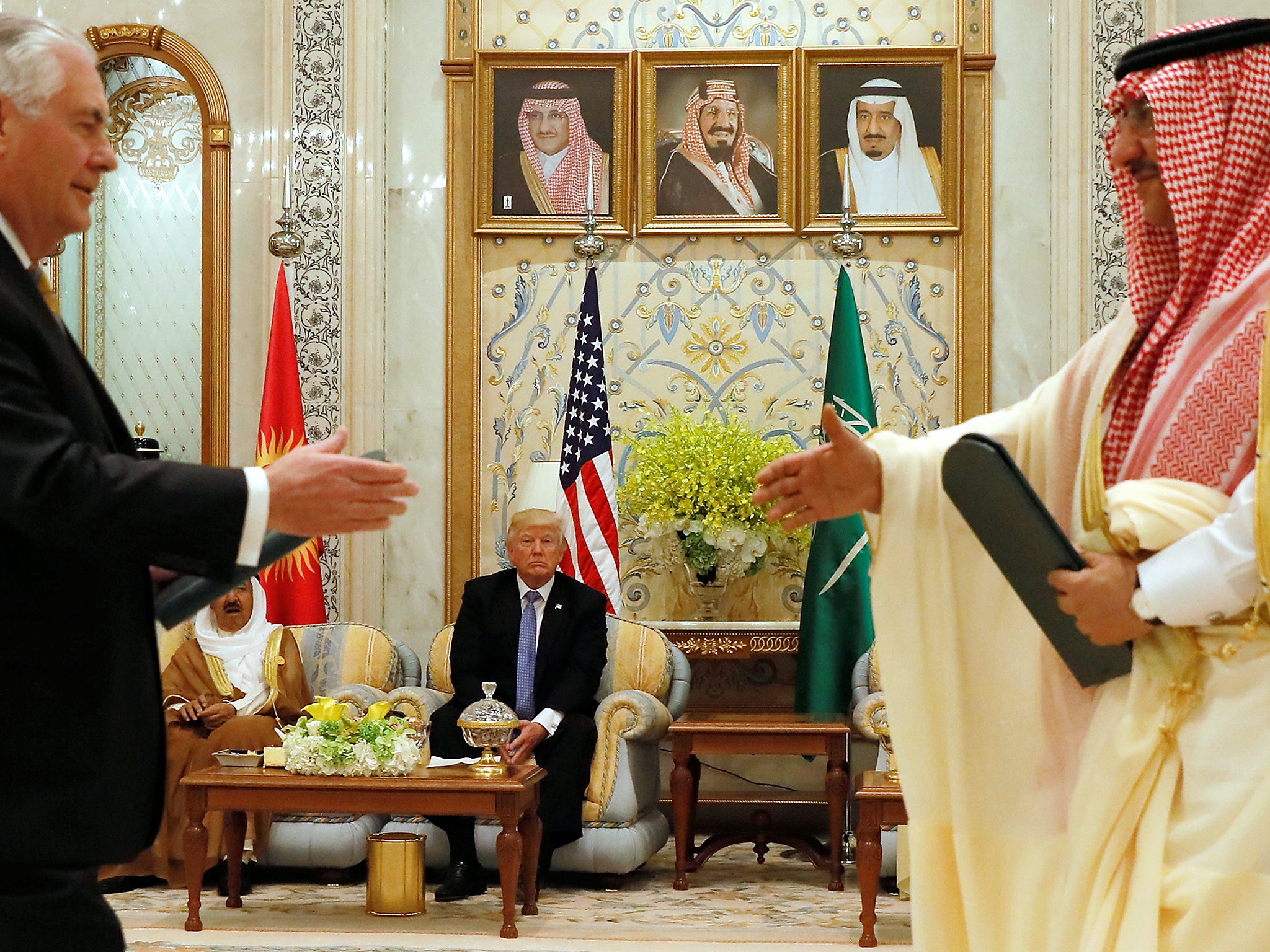Donald Trump has become Saudi Arabia’s puppet in the Qatar crisis
The Saudis offered a Sword Dance to Trump, and in one tweet he has more or less ignored the role that Saudi played in 9/11, pointed the finger at Iran and said to the Saudis, 'If you want Qatar, go for it'


Donald Trump issued a triumphal tweet, declaring that his trip to Saudi Arabia has already paid off with a Saudi crackdown on Qatar. This single tweet shows just how out of depth US policy has become in the six months since Obama left office.
So why has the issue with Qatar blown up, why now and what do we need to know to understand it?
Firstly, we do need to paint a very broad and generalised brush of history to begin, and I really mean “only begin”, to understand what is going on.
Westerners, when looking at the Middle East, often think the disputes in the region can be boiled down to the Arab-Israeli dispute. The creation of the Jewish State and the dispossession of the Palestinians is thought by some to be the heart of all things.
Commentators, when discussing this 70-year-old dispute often bring Iran into the mix, as the American President now does. Unfortunately, this Israel centric narrative forgets one very important point.
Iranians are not Arabs. Iranians are Persian.
The Persians and the Arabs have been fighting since well before not only the creation of Israel a mere 70 years ago, long long before Muhammad popped up in the seventh century to found Islam, but at least back to when Persian King Darius ruled Egypt in the fourth century BC.
Even to some in Egypt, Darius is recent history. Let’s talk Pharaohs, pyramids and Moses, to get some degree of historical perspective of just how long the Egyptians and Persians have been fighting.
Once Muhammad created Islam, religion became even more important. Anyone who is anyone in the world of Islam wants to control Mecca and set the direction and narrative for Islam. The Persians (Iran) are Shia, the Egyptians Sunni, albeit moderate, and the Saudis follow the stricter version of Wahhabism, which itself is a sect of Sunni Islam. All want to dominate.
For centuries, the Ottomans controlled Mecca until their empire collapsed following World War One, which coincided with the discovery and valuation of oil.
The British, understanding the power of oil, chose one tribe of Arabs to lead the Arabian Peninsula – the al-Saud family, who have been ruling most of the peninsular ever since.
Most, but not all.
A fair minority of the Arabian Peninsula is ruled by other absolute monarchies like the Emirs of the Emirates, the Emir of Oman, Bahrain, and yes, Qatar. Let’s leave Yemen to the side for just a moment.

The Qataris are, like the Saudis, Sunni Islam. However the al-Thani ruling family of Qatar descend from a tribe of Bedouins that fought the al-Saud family well before Lawrence made the al-Saud family the rulers of Mecca, and then promptly crashed his motorcycle.
To complicate matters further, even though they are Sunni, the Qataris supported the Muslim Brotherhood opposition to Mubarak in Egypt, funded in large part by the Iranian Persians.
Prior to the Islamic Revolution in Iran, the Egyptians and Persians were unusually getting along as the Shah married King Farook’s sister. The Shah is now buried in Cairo in a mosque next to where King Farook, as the last King of Egypt, is also buried.
The Islamic Revolution started another round of the millennia old Egypt versus Persian fighting. Iran, with Qatar’s help, funded the Muslim Brotherhood in Egypt ultimately, with American help, seeing the end of Mubarak and the bringing in of Mohammad Morsi as the Egyptian ruler.
The Iranians and the Egyptians were happy again. However a happier Iranian-Egyptian partnership really annoys the Saudis and scares the Israelis, so Saudi Arabia and Israel jointly lobbied the Americans for the end of Morsi. Surprise, surprise then when the Americans then supported the end of Morsi, the rise of al-Sisi in Egypt and the sidelining of Iran.
In return al-Sisi in Egypt offered two islands in the Gulf to the Saudis as a bit of a “thank you”. Israel sat back and watched their enemies descend on each other. The Saudis ramped up their war in Yemen, which is a proxy war with Iran, and started to focus again on their own Bedouin enemies – Qatar.
Why Qatar? When you look at a map of the Arabian Peninsula you can see how some military planners in Saudi would think that Qatar, as an independent state, makes no sense. They may think it better off as a province of Saudi and “unite the historically divided Bedouin tribes of the peninsula”. Oh, and the Qataris have gas, lots of it.
But you can’t invade Qatar, as Qatar has a US air base and the Americans might get upset. So you would need to move the Americans off the fence.
The Saudis offered a Sword Dance to Trump, and in one tweet he has more or less ignored the role that Saudi played in 9/11, pointed the finger at Iran and said to the Saudis, “If you want Qatar, go for it”.
Someone in Saudi Arabia must be giving thanks for Donald Trump. Has Trump been played like a pup? I bet the Qataris and Iranians think so.
Andrew MacLeod is a visiting Professor at Kings College London
Join our commenting forum
Join thought-provoking conversations, follow other Independent readers and see their replies
Comments
Bookmark popover
Removed from bookmarks